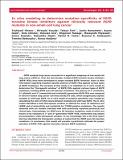| dc.contributor.author | Hirano, Toshiyuki | en_US |
| dc.contributor.author | Yasuda, Hiroyuki | en_US |
| dc.contributor.author | Tani, Tetsuo | en_US |
| dc.contributor.author | Hamamoto, Junko | en_US |
| dc.contributor.author | Oashi, Ayano | en_US |
| dc.contributor.author | Ishioka, Kota | en_US |
| dc.contributor.author | Arai, Daisuke | en_US |
| dc.contributor.author | Nukaga, Shigenari | en_US |
| dc.contributor.author | Miyawaki, Masayoshi | en_US |
| dc.contributor.author | Kawada, Ichiro | en_US |
| dc.contributor.author | Naoki, Katsuhiko | en_US |
| dc.contributor.author | Costa, Daniel B. | en_US |
| dc.contributor.author | Kobayashi, Susumu S. | en_US |
| dc.contributor.author | Betsuyaku, Tomoko | en_US |
| dc.contributor.author | Soejima, Kenzo | en_US |
| dc.date.accessioned | 2016-04-01T15:47:34Z | |
| dc.date.issued | 2015 | en_US |
| dc.identifier.citation | Hirano, T., H. Yasuda, T. Tani, J. Hamamoto, A. Oashi, K. Ishioka, D. Arai, et al. 2015. “In vitro modeling to determine mutation specificity of EGFR tyrosine kinase inhibitors against clinically relevant EGFR mutants in non-small-cell lung cancer.” Oncotarget 6 (36): 38789-38803. | en |
| dc.identifier.issn | 1949-2553 | en |
| dc.identifier.uri | http://nrs.harvard.edu/urn-3:HUL.InstRepos:26318542 | |
| dc.description.abstract | EGFR mutated lung cancer accounts for a significant subgroup of non-small-cell lung cancer (NSCLC). Over the last decade, multiple EGFR tyrosine kinase inhibitors (EGFR-TKIs) have been developed to target mutated EGFR. However, there is little information regarding mutation specific potency of EGFR-TKIs against various types of EGFR mutations. The purpose of this study is to establish an in vitro model to determine the “therapeutic window” of EGFR-TKIs against various types of EGFR mutations, including EGFR exon 20 insertion mutations. The potency of 1st (erlotinib), 2nd (afatinib) and 3rd (osimertinib and rociletinib) generation EGFR-TKIs was compared in vitro for human lung cancer cell lines and Ba/F3 cells, which exogenously express mutated or wild type EGFR. An in vitro model of mutation specificity was created by calculating the ratio of IC50 values between mutated and wild type EGFR. The in vitro model identified a wide therapeutic window of afatinib for exon 19 deletions and L858R and of osimertinib and rociletinib for T790M positive mutations. The results obtained with our models matched well with previously reported preclinical and clinical data. Interestingly, for EGFR exon 20 insertion mutations, most of which are known to be resistant to 1st and 2nd generation EGFR-TKIS, osimertinib was potent and presented a wide therapeutic window. To our knowledge, this is the first report that has identified the therapeutic window of osimertinib for EGFR exon 20 insertion mutations. In conclusion, this model will provide a preclinical rationale for proper selection of EGFR-TKIs against clinically-relevant EGFR mutations. | en |
| dc.language.iso | en_US | en |
| dc.publisher | Impact Journals LLC | en |
| dc.relation.hasversion | http://www.ncbi.nlm.nih.gov/pmc/articles/PMC4770737/pdf/ | en |
| dash.license | LAA | en_US |
| dc.subject | EGFR mutation | en |
| dc.subject | EGFR tyrosine kinase inhibitors | en |
| dc.subject | EGFR exon 20 insertion mutations | en |
| dc.subject | in vitro modeling | en |
| dc.subject | lung cancer | en |
| dc.title | In vitro modeling to determine mutation specificity of EGFR tyrosine kinase inhibitors against clinically relevant EGFR mutants in non-small-cell lung cancer | en |
| dc.type | Journal Article | en_US |
| dc.description.version | Version of Record | en |
| dc.relation.journal | Oncotarget | en |
| dash.depositing.author | Costa, Daniel B. | en_US |
| dc.date.available | 2016-04-01T15:47:34Z | |
| dash.authorsordered | false | |
| dash.contributor.affiliated | Costa, Daniel | |
| dash.contributor.affiliated | Kobayashi, Susumu | |


